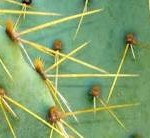 He had to stretch out every inch of his four foot frame to do it, but he caught the ball as he tumbled into the edge of the woods. It was one of our regular backyard family football games; I was the quarterback, and my son Blayze, was the daring receiver.
He had to stretch out every inch of his four foot frame to do it, but he caught the ball as he tumbled into the edge of the woods. It was one of our regular backyard family football games; I was the quarterback, and my son Blayze, was the daring receiver.
As we celebrated his catch, Blayze jumped up as well, but not in celebration. He pulled up his shirt, writhing and twisting in pain, reaching for his belly and back. It didn’t take long to figure out what was wrong.
Where he had landed, beneath the fallen leaves, was a short scrubby cactus someone had planted or thrown out years ago. This prickly little beast did not, thankfully, have the giant stickers you might expect. Otherwise, Blayze’s catch may have been far bloodier. Rather, this little cactus was covered with what botanists call “glochids.”
Glochids are tiny, tiny hair-like stems found on some cacti. They are as thin as the smallest splinter, sometimes clear in color, and when a few hundred of these find your back side, their size does not matter. They are excruciating.
Our game ended with that last catch. For the next 30 minutes Blayze soaked in a tub of hot water while I sat beside him with a flashlight, a pair of tweezers, and a bottle of Peroxide, pulling out glochids until I lost count.
Luckily for Blayze I had some experience with this kind of emergency medical care having learned my own cactus lesson years earlier in theUtahdesert. But that is a story of stupidity for another time.
Jennifer Yane said, “I try to take one day at a time, but sometimes several days attack me at once.” We know how that feels; like a hundred glochids stuck in our rear end. If it was just one day we had to worry with, just one problem, we could manage very well.
Or maybe even two splinters stuck in our skin – three or four; but it never seems to work that way. The tax bill comes due the same week the washing machine goes on the blitz; the same week the kids need braces; the same week you get diagnosed with an ulcer; the same week pink slips go out at work.
All at once, like a plunge into a sticker bush, all of these get their barbs into you. It hurts. Writhing. Twisting. Crying. Looking for a little help.
The Apostle James, sounding a bit sadistic if you ask me, said that at such times – when our troubles are numerous and varied – we should be joyful. We should actually be happy. Why? Because the end result of such “trials and tribulations” is maturity and wisdom.
In other words, hard times can make you better. Difficulties can make you smarter. When several days attack you at once and you have lost count of the splinters pulled from your skin, grit your teeth and smile: Your character is being developed.
But most of us live with this disconnect: We want maturity without the pain. We want to be smarter without the splinters. We want resurrection power without the suffering of a cross. We want wisdom without the glochids. It just does not work that way, even though I wish it did.
See, I am stubborn. It takes me a while to “get it” whatever “it” is. It appears that I have to fall into the cactus two, three, four times before I learn to stay away from the woods. I have to soak in Peroxide several times before I get it through my thick skull that certain things will hurt me. So once I do “get it,” I have all the scars, wounds, and war stories to prove so.
Now, do I think God is up in heaven causing me all this pain? No, no more than I wanted for my son to belly flop into a Prickly Pear cactus bush. But in the aftermath, I did want him to learn a few things, and for certain I did not leave him to himself to pull the briars out. Neither will God.
So if you are in the briars now, I’m sorry. There’s no easy way out. But you’ll get through it, one tweezer pull at a time. Then you will be on your way stronger, better, and wiser.

